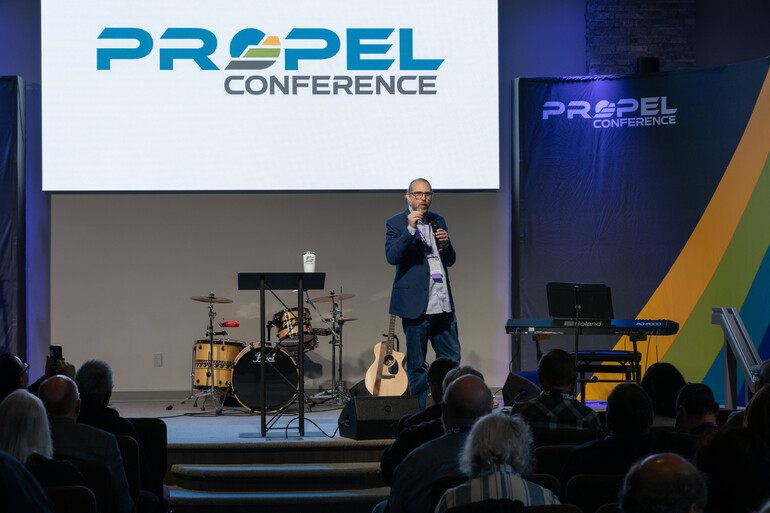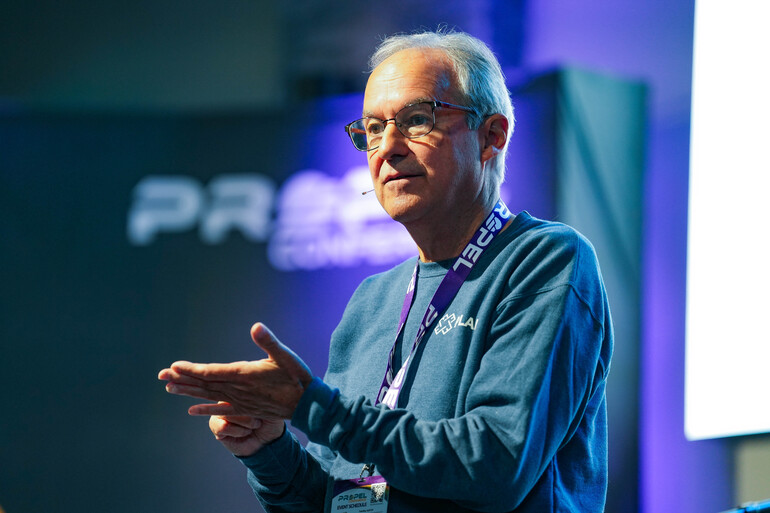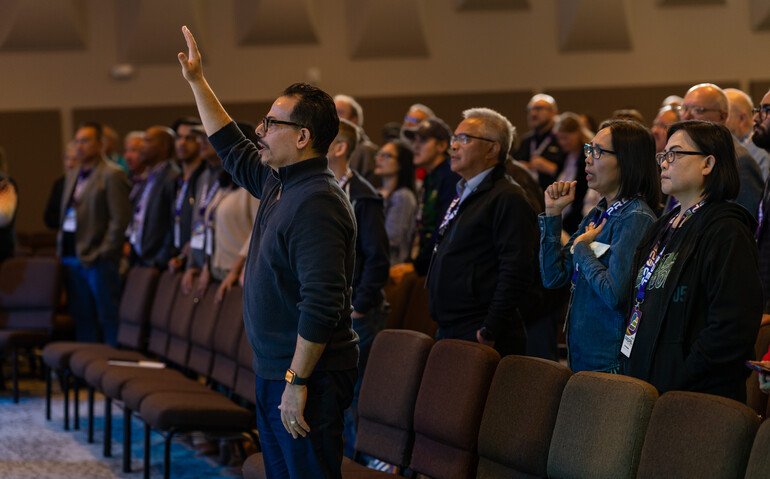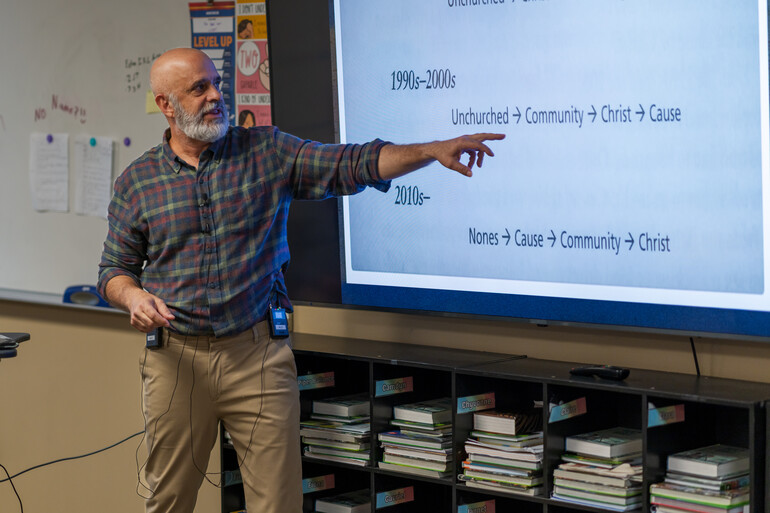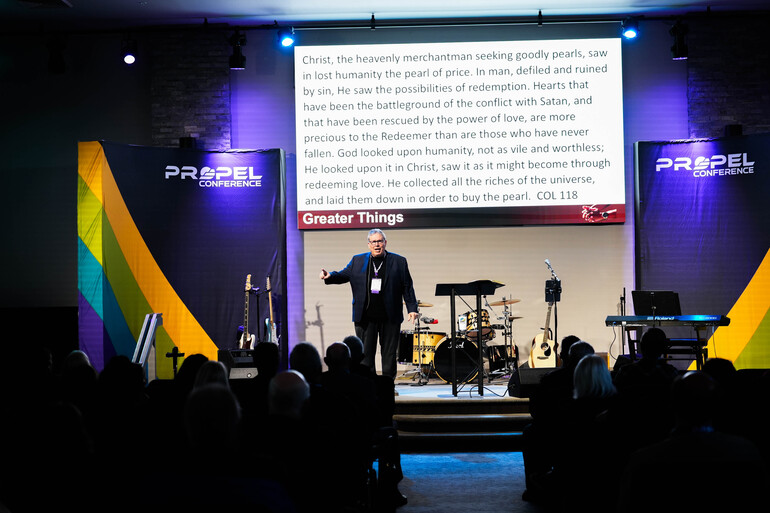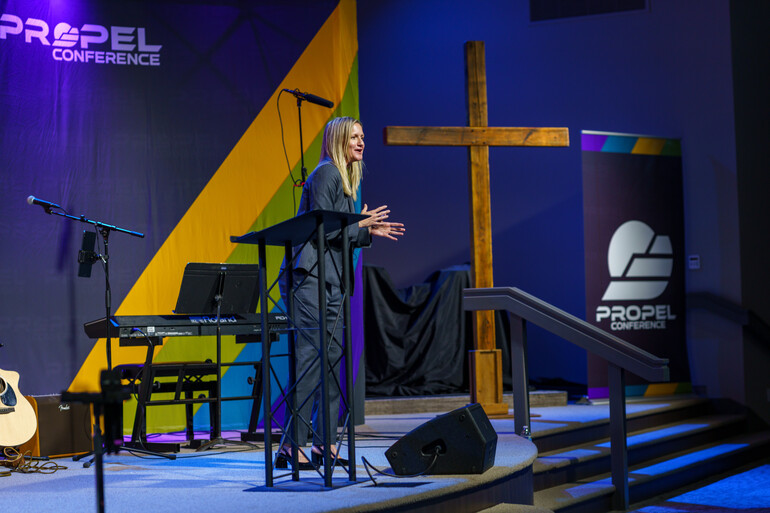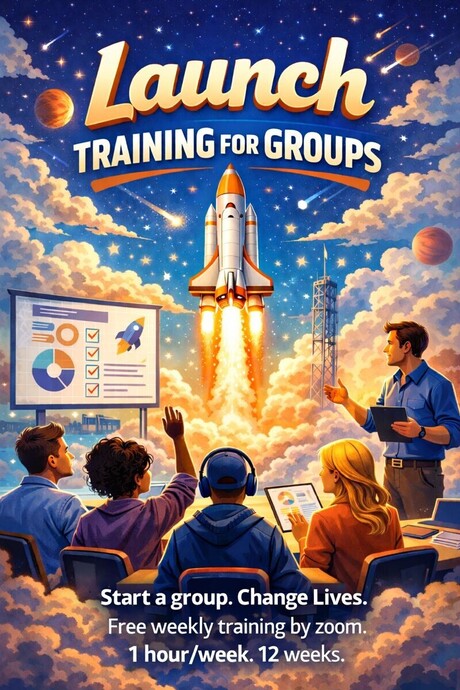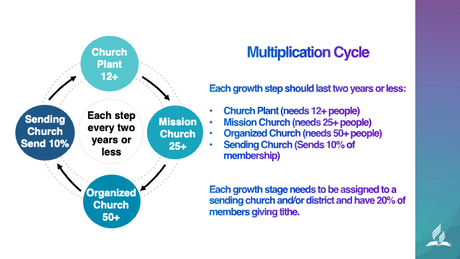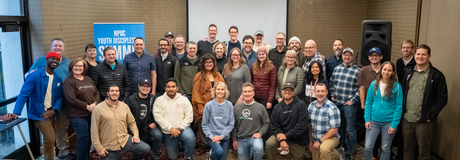Propel Conference, in its third year, attracted 40 presenters and ministry partners and 220 participants to four days of intensive and practical church growth and evangelism training. Participants ranged from new members to pastors, leadership teams, experienced evangelists and church administrators.
This was a highly energized group — active leaders already engaged in their churches. The synergy in the room was palpable. It wasn’t just what they learned, but what they were ready to carry home.
“We believe that healthy churches grow — and that growth starts with healthy leaders,” said Larry Witzel, Propel Conference visionary and SermonView founder/president. “Our dream is that this experience will propel churches forward with confidence, clarity and a renewed sense of purpose.”
To help participants return home with God-inspired direction, Propel Conference offers a practical playbook for church growth and evangelism, including identifying the state of the church, nurturing a heart for people, innovating for the future, living out the mission and going out with holy boldness.
Identifying the State of the Church
Jose Cortes Jr., North American Division associate ministerial director, opened Propel Conference — held this year at Puyallup Adventist Church and Northwest Christian School in Washington state — by describing the current “state of the church.”
Currently, there are 7,155 congregations in North America, representing 5,737 established churches, 885 companies and 533 church plants. The Adventist Church in North America has seen 42,409 baptisms in 2024 and a total of 154,630 baptisms over the past five years, Cortes reported.
While the statistics reflect consistent evangelistic activity, Cortes challenged attendees to look beyond numbers and focus on long-term spiritual growth.
“The end result of evangelism is not a baptism; it’s a disciple,” Cortes said. “A disciple is someone who loves Jesus, lives by His teachings and leads others to Him. Discipleship is more than head knowledge; it's action driving. We’re encouraging people across North America to be more than a member, to be an active disciple.”
Church growth leaders estimate that to reach a population of 361 million people, one Adventist church is needed for every 25,000 people. With this model, there would need to be 15,000 Adventist churches — nearly double the number currently in existence.
With this vision in mind, Cortes issued a heartfelt appeal for broad involvement in church planting.
“We need elders, lay people and people from a variety of professions to be involved in church planting,” he said. “We cannot do this without you. God needs you. Our church needs you!”
Currently, an estimated 600 volunteer lay pastors serve across 43 churches in North America. That number is steadily growing, with several initiatives — including in the Pacific Northwest — focused on expanding lay leadership and planting new congregations. In the last year alone, 125 new churches were planted, bringing the five-year total close to 500.
To help churches understand where they stand and where growth is needed, Cortes outlined four common stages of church life: multiplying, growing, plateauing or declining.
“The state of the church is what you make it to be,” Cortes said. “Do an annual checkup on your church vitality.”
Pastors and church leaders can track church vitality each year using the eAdventist membership database, which includes data on attendance, membership, baptisms, church planting and other key indicators.
Nurturing a Heart for People
One of the most important foundations of evangelism, according to several presenters, is a genuine, Spirit-led compassion for others.
David Klinedinst, Forecasting Hope Bible Prophecy speaker, guided Propel Conference attendees in opening their hearts and identifying their passion for soul winning.
“No matter your preferred form of evangelism — proclamation, creative or humanitarian — you have to have a heart for people,” Klinedinst said. “God wants us to be intensely interested in the salvation of others” (see Ellen White’s Fundamentals of Christian Education, chapter 27).
“We don’t need to completely separate ourselves from the people of the world. We can’t be content to throw information at people. We have to engage with people and walk with them,” he emphasized. “Friendships and relationships are the first step, universally, of evangelism. You will never win someone to Jesus who doesn’t trust you.”
Building on this heart-level approach to ministry, Joanne Cortes, BeLove pastor from Potomac Conference, explained how appeals flow from authentic relationships.
“An appeal is a heartfelt invitation for people to make decisions for Christ,” she said. “The Holy Spirit works in many ways. You don’t need a microphone to make a life-changing appeal. You don’t have to have a platform. Some of the best appeals happen in a personal conversation. God needs you and your story. Who in your life is ready to say yes to Jesus?”
In a culture increasingly marked by skepticism and disconnection, Roger Hernandez, evangelist and author of more than 30 books, emphasized the importance of spiritual resilience and relational depth.
“Your superpower is to be unoffendable,” Hernandez said. “Disagreement does not equal dislike. If I must eliminate you to elevate myself, I am not winning. Invest in people. Be a lifelong learner. Mentor and be mentored. Be generous. Operate in your gifting.”
Innovating for the Future
Breaking through plateaued or declining growth often requires confronting the barriers that hinder innovation.
“Holy discontent is where innovation begins,” said Witzel in his keynote. “Innovation is about being faithfully adaptable. It means we lead with purpose, not preference. It’s about doing something different for the sake of effectiveness.”
Witzel identified several common barriers to innovation:
1. An institutional culture that punishes failure,
2. Controlling or over-controlling leadership,
3. Overly habituated volunteers,
4. Insecurity and impostor syndrome,
5. A chronic need for affirmation.
“Failure is a data point that moves us forward,” he said. “Try, learn, try again. Sometimes it takes 2,000 ideas to generate one breakthrough. Lean in; keep showing up!”
He explained that the innovation cycle begins with a burden — a broken heart — and continues through a process of listening, naming the problem, hypothesizing solutions, launching a test pilot, measuring outcomes, learning from the results, repeating as needed and celebrating both progress and lessons learned.
Jennifer Woody, Monroe Adventist Church pastor in Washington, also challenged attendees to consider what may be holding them back from fully embracing their mission.
Quoting D. L. Moody, she said, “The greatest fear shouldn’t be of failure, but of succeeding at something that doesn’t matter.”
“The mission isn’t finished because we are distracted and multitasking,” Woody said. “Compartmentalization is killing the mission of the church.”
Woody outlined five common hindrances to effective leadership: distractions, fear of what others think, perfectionism, a craving for recognition and comfort that deadens calling.
“To follow Christ means to let go of everything else,” Woody urged. “If I don’t let go, I become deadweight to mission. Trust God with all of you. Surrender your pain, your hindrances in life, to God. Pain reveals what you’ve been leaning on besides Jesus.”
Throughout the event, workshop tracks were woven in to support and expand on the keynote messages. Presenters such as Dustin Hall, church revitalizer and Try Jesus Auburn podcast host; Kathy Hernandez, Southern Union ministerial and evangelism leader; Alex Portillo, southwest Washington pastor and digital content creator; Roger Walter, Adventist Community Church pastor and EvangeLead founder; Dustin Serns, Washington Conference church plant coordinator and others helped attendees go deeper into topics of proclamation evangelism, relational evangelism, digital outreach and church revitalization.
In closing, Witzel reminded attendees: “God has you where you are right now for a reason. He’s given you talents, gifts and experiences that only you have. You are the only one who can do what He wants to do in the coming days, weeks, months and even years. So take courage, be strong. God has a vision for your church that is bigger than you can possibly imagine. What He started, He will finish.”
Living Out the Mission
If you think revitalizing a plateaued or declining church is impossible, the story of Kojo Twumasi’s church will change your mind — God quadrupled their membership in just one week!
When Twumasi arrived as the new pastor of a two-church district in Ohio, only five people attended Sabbath School and three came for the worship service at one of the churches. But while the numbers were small, the ministry was strong — the church operated a food bank and hosted regular community dinners.
Still, something was missing. The church needed to move from simply meeting needs to intentionally making disciples.
“Good work without good news is just social work,” Twumasi said. “We are called to gospel work.”
The church leadership agreed to host a one-week summer evangelism initiative, combining three keys Ellen White identified as essential: the power of persuasion, prayer and the love of God (see Ministry of Healing, p. 143).
“When we work, we work. When we pray, God works,” Twumasi said. “God’s work begins when we are on our knees.”
Traditionally, outreach and proclamation evangelism operate in separate lanes. But Twumasi and his team asked, “What if we bridged the two — showing God’s love while sharing His word?”
They called the event Summer BLAST — Building Lives Around Solid Truth. With a clear understanding of their community’s needs, the church offered nightly community dinners, free clothing, nightly prizes, engaging children’s programming — including Vacation Bible School curriculum and fun activities — and nine gospel-centered messages that spoke directly to local pain points.
Summer BLAST was promoted through social media, along with email and text reminders. On opening night, 276 guests attended — 120 adults and 156 children. Throughout the week, 90 adults and 110 children continued participating in the outdoor tent gatherings. The appeal of the week was to keep the Sabbath and be baptized.
By the week’s end, the church celebrated 58 baptisms.
“Evangelism gave life back to our church,” Twumasi said.
Since then, other churches across the country have adopted and adapted the BLAST model — one even welcomed 1,000 pre-registered community guests.
Going Out with Holy Boldness
As Propel Conference drew to a close, Dan Serns, North Pacific Union church growth director, challenged participants to embrace boldness in their calling.
“God has put bold things on your heart to be a church planter or church revitalizer,” Serns said. “Don’t let the devil dumb down the big thing God is calling you to do.”
He emphasized the importance of active participation in ministry, urging attendees not to settle for mere obedience, but to live with purpose and passion.
“Your job is more than to pray, pay and obey,” Serns said. “Otherwise, you will sit, soak and sour. Everyone is needed in ministry. There will never be enough money to hire enough pastors and evangelists. The disruptive things in our lives may be God calling you to something bigger. Share Jesus with the world.”
Acknowledging the challenges that lay ahead, Serns reminded the church growth leaders that they would likely face opposition when they returned home.
“Stay on track with the dream God has placed in your heart,” Serns advised. “In Acts 1, we’re told to ask for the Holy Spirit’s boldness, to keep talking about Jesus and to be willing to go anywhere Jesus leads.”
In the final moments of Propel Conference, Doug Bing, Washington Conference president, shared a story from his one-and-only fishing trip to illustrate key lessons about perseverance in ministry.
“There’s a difference between fishing and catching,” Bing said. “Be patient and ready to fail over and over. Pay attention to the nibbles on the line. Follow Jesus, your Guide, and you will learn where to fish, when to change the bait and when to call for decisions. Follow Jesus and He will propel you forward to make fishers of men in the right places, to innovate and be intensely interested in people, and to celebrate the decisions people make.”
Propelling Forward
Washington Conference, as the host site, highly encouraged and incentivized Pentecost 2025 evangelism initiative participants to attend Propel Conference.
“I’ve participated in a lot of training in my pastoral career. So often, it hits my head, I go home with a headache and I leave with my heart not encouraged,” said Collette Pekar, Port Townsend Adventist Church pastor in Washington. “This time, not only is my head full, but also my heart is full. I am so thankful to have this kind of training from an Adventist perspective.”
As part of the scheduled activities, Pekar took her team to dinner to debrief, dialogue and brainstorm together. “We talked about the roles we will take in the future, how to better engage our community and how to help our church thrive. We are talking about how to revamp how we do mission,” Pekar said.
Vidal Mendoza, Enumclaw Adventist Church pastor in Washington, brought his team to learn how to dive deeper into evangelism.
“We’ve been incredibly blessed by the ideas shared by other pastors and leaders,” he said. “We’re learning what to do, how to do it and how to truly impact the world.”
One of his members, Laurie Sim, regularly hosts food preservation and preparation classes for the community.
“Propel stretched my mind to tap into extra resources and to be bolder in including invitations to study the Bible,” she said. “At the end of my bread baking class, for example, I can invite people to study about the Bread of Life.”
Rick Moyer, Voice of Hope lay leader in Washington, attended Propel Conference last year.
“I was there last year and learned a lot that I was able to put into practice right away,” Moyer said. “This year, I brought seven people from my two churches. Everybody has been enjoying and benefiting from this training.”
The Voice of Hope team brought one of their newest members, Ed Chapin, who was baptized three months ago.
“It’s been pretty interesting and overwhelming for a new guy to come to Propel Conference,” Chapin said. “I want to try to be a disciple, a fisherman, you know? Especially now that I am going to be retired after 47 years doing auto body work to repair wrecked cars.”
Chris Evenson, Nampa Adventist Church pastor in Idaho, returned to Propel Conference with a team from his church on the heels of finishing a major evangelism outreach.
“We are here learning principles to take home and apply to our evangelism efforts,” he said. “We want to be more effective. You’ll never lead someone to Christ if they don’t trust you. We want to build deeper relationships.”
“Propel is an affirmation to keep pressing forward and leaning on the Holy Spirit,” said Ofa Langi, Auburn City Adventist Church lead pastor in Washington. “It’s a reminder to stay faithful in the calling we’ve received.”
The next Propel Conference will be held April 12–15, 2026 in the Washington D.C. area as a collaboration between Chesapeake and Potomac Conferences in partnership with Propel Conference, SermonView evangelism marketing team and related church growth partners.
You can listen to current and archived messages from Propel Conference on the upcoming Propel Podcast, available at propelconference.com.
To view a full gallery of photos from the event, visit nwadvent.st/xbNSQ.





